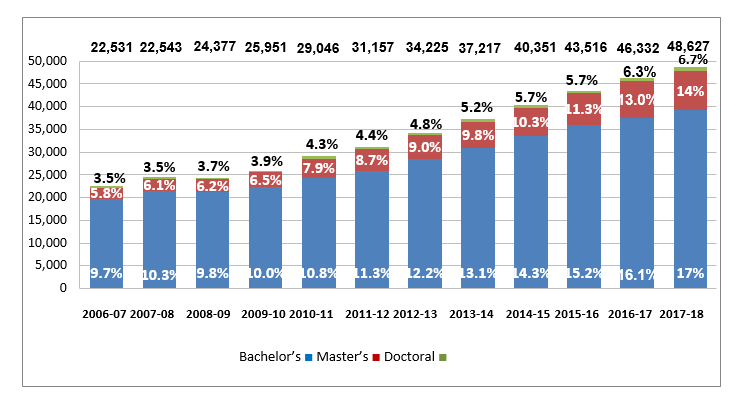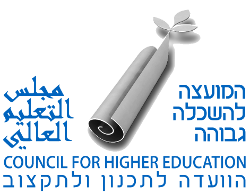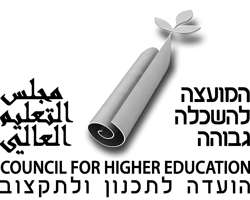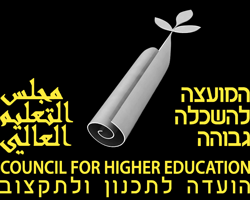Higher Education Accessible to Arab Students
The number of students doubled & the goal was reached 3 years earlier than originally planned
Within a decade, the number of Arab students doubled from 22,543 (2007-08) to 48,627 (2017-18)
CHE has achieved the goals set for 2022:
- Bachelor’s degrees – 82% increase in the number of students
- Master’s degrees – 228% increase in the number of students
- Doctoral degrees – 114% increase in the number of students
Chairperson of the Planning and Budgeting Committee (PBC), Prof. Yaffa Zilbershats: “The revolution integrating Arab students into higher education is very good news for Israeli society in general and for Arab society in particular. Thanks to a comprehensive, holistic program, personal accompaniment and guidance, beginning in high school and continuing through advanced degrees, as well as a significant investment of resources, we have successfully opened the gates of higher education to Arab students, and removed barriers that have existed for decades. Academia is the key to reducing gaps, social leadership, employment and integration into Israeli society.”
CHE Deputy Chairperson, Prof. Ido Perlman: “The integration of Arab society into academia is a national challenge, and the data being published today shows that we have met the challenge. Expanding the circle of Arab college students in Israel facilitates their optimal integration into Israeli society, and reduces the number of Arab students traveling overseas to study. Today, Arab students study on all Israeli university and college campuses. Now, the challenge is to guide students toward studying science, high-tech and other fields that are in-demand both in the economy and in Arab society.”
An impressive achievement for higher education as a whole and for Arab society specifically – The new multiyear plan for the 2017-22 set goals for expanding the representation of the Arabs in higher education by 2022. The goal was set, on the basis of the proportion of Arabs in Israeli society as a whole.
- Undergraduate degrees – Goal 17% (reached)
- Masters degrees – Goal 12% (exceeded, the actual percentage is 14%)
- Doctoral degrees – Goal 7% (almost achieved, actual enrollment 6.7%)
From the data, it emerges that in 2007, 22,543 Arab students were studying at academic institutions in Israel, for all degrees. Thanks to the broad support system provided, their number doubled within a decade, and there were 48,627 Arab students studying in Israel in 2018. The sharp increase means that CHE was able to meet the goals set for making higher education accessible to Arab students during the current academic year, three years before the original plan.
According to data for the 2007-08 academic year, the number of Arab undergraduate students that year was only 21,534, approximately 10% of the total number of undergraduates in Israel. A decade later, in 2017-18, 39,160 Arab students were studying for bachelor’s degrees in Israel, accounting for 17% of the total number of undergraduate students.
On the master’s level, the number of Arab students studying in Israel grew by 228%. In 2007, only 2654 Arab students were studying for master’s degrees in Israel, representing 6% of the total number of master’s students. In 2017-18, the number had grown to 8708, which was 14% of the total number of master’s students. During the same period, there was also a significant increase of approximately 115%, in the number doctoral students, from 759 in 2017-2018, compared to only 349 in 2007-08.
In this context, it is important to note the significant increase in the participation of Arab women in higher education. In the early 1990s, approximately 40% of the Arab students studying for bachelor’s degrees at Israel universities were women but in 2018, their proportion rose to two-thirds, compared to one-half among Jewish students
Program for integrating Arab students in Israeli higher education
In the context of its multiyear plan, PBC is operating a holistic program, beginning with Rowad (“Gate to Academia”) Program for high school students, which is now functioning in approximately 45 regional clusters. The program exposes young people to available options, and provides information, counseling and academic guidance, as well as support for relevant courses (e.g. preparation for the psychometric aptitude test), college tours, and a higher education fair in cooperation with local educational institutions.
Furthermore, there are special support programs for Arab students in pre-academic preparatory programs and those studying for bachelor’s degrees, including language enrichment in Hebrew and English, and academic, economic and social support. At academic institutions, designated specific centers have been established for Arab students, and 800 students in each class-year receive Irteka Scholarships. The students are selected on the basis of their socio-economic situation and enrollment in “preferred fields.” The scholarship is granted for the entire degree program. PBC also supports excellence, and grants scholarships to outstanding students from Arab society who are studying for advanced degrees, including master’s degrees, doctorates, and post-doctoral fellowships, as well as supporting the hiring of outstanding faculty members from Arab society.
Table: Multiyear view of the number Arab students
| Bachelor’s | Master’s | Doctoral | Total | |
| 2006-07 | 19,761 | 2,421 | 349 | 22,531 |
| 2007-08 | 21,534 | 2,654 | 355 | 24,543 |
| 2008-09 | 21,142 | 2,855 | 380 | 24,377 |
| 2009-10 | 22,268 | 3,270 | 413 | 25,951 |
| 2010-11 | 24,346 | 4,243 | 457 | 29,046 |
| 2011-12 | 25,843 | 4,847 | 467 | 31,157 |
| 2012-13 | 28,481 | 5,233 | 511 | 34,225 |
| 2013-14 | 30,969 | 5,692 | 556 | 37,217 |
| 2014-15 | 33,571 | 6,165 | 615 | 40,351 |
| 2015-16 | 35,963 | 6,929 | 624 | 43,516 |
| 2016-17 | 37,441 | 8,197 | 694 | 46,332 |
| 2017-18 | 39,160 | 8,708 | 759 | 48,627 |


